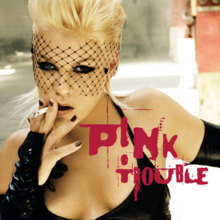| "Trouble" | ||||
|---|---|---|---|---|
 | ||||
| Single by Pink | ||||
| from the album Try This | ||||
| B-side |
| |||
| Released | September 29, 2003 | |||
| Genre | ||||
| Length | 3:12 | |||
| Label | ||||
| Songwriter(s) |
| |||
| Producer(s) | Tim Armstrong | |||
| Pink singles chronology | ||||
| ||||
| Music video | ||||
| "Trouble" on YouTube | ||||
"Trouble" is a song recorded by American singer Pink for her third studio album, Try This (2003). Initially written by Tim Armstrong for his band Rancid, the song was re-written with Pink after its was brought to her attention. Produced by Armstrong, "Trouble" is a pop friendly punk-rock tune,[2] that features a gritty and choppy guitar riff, with Pink describing it as a "fun song."[3] Lyrically, it has the singer playing up on her bad-girl image, with her persona and anger promising unrest in her city.
The song was released by Arista Records as the album's lead single on September 29, 2003. It earned largely positive reviews from music critics who ranked it among the standout tracks on its parent album, though some called the song "repetitive." Commercially, it became a top ten hit on most of the charts in appeared on, reaching the top five in Austria, Canada, Croatia, Norway, and Switzerland. In the United States, "Trouble" underperformed, peaking at number 68 on the Billboard Hot 100 only.
Sophie Muller was consulted to film a music video for the song, which is set on a ranch and features appearances from The Pussycat Dolls and actor Jeremy Renner. In 2004, "Trouble" earned Pink her first Grammy Award for her solo work when it won Best Female Rock Vocal Performance. A subsequent cover by Shakin' Stevens was also commercially successful in the United Kingdom, peaking at number 20 in 2005.[4] In 2012, Armstrong would finally record the song himself under the name Tim Timebomb.
- ^ Molanphy, Chris (March 10, 2023). "Raise Your Glass Edition". Hit Parade | Music History and Music Trivia (Podcast). Slate. Retrieved April 16, 2023.
- ^ Cite error: The named reference
ewwas invoked but never defined (see the help page). - ^ Cite error: The named reference
mtv_September 29, 2003was invoked but never defined (see the help page). - ^ "Shakin Stevens". Official Charts Company. Retrieved September 13, 2022.